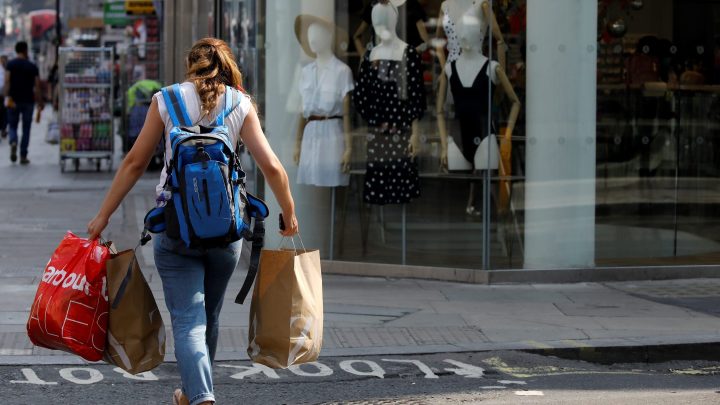
Consumers are finding ways to justify spending, even if it busts their budget
Consumers are finding ways to justify spending, even if it busts their budget

“Revenge” spending and other recent trends show that Americans keep finding ways to justify their outlays even when many are financially strained. Whether it’s buying an afternoon latte or Taylor Swift concert tickets, consumers aren’t holding back. Yet household debt and credit card delinquencies are on the rise.
“Marketplace” host Kai Ryssdal asked Adriana Samper, associate professor at Arizona State University’s W.P. Carey School of Business, to explain what’s driving the current passion for spending money. Below is an edited transcript of their conversation.
Kai Ryssdal: Consumer behavior since the pandemic has really changed. Characterize how we’re spending our money, would you?
Adriana Samper: This notion of revenge spending has come about. Individuals in the pandemic felt as though there were limitations from the start. And so our spending habits were very, very much curbed. So now, the notion of coming out, being able to engage in things like fine dining, more social interactions — which are accompanied by expenses — has led to an increase in spending overall.
Ryssdal: Does revenge spending eventually cool? When are we going to sort of get out of this?
Samper: We would expect so. There have been some indicators, despite retail sales being high in July and consumer confidence being high. Student loan payments are starting in October. Discount retailers are starting to see an increase in spending, which can be an indicator that people are starting to watch their wallets again.
Ryssdal: As we watch our wallets, though, what are the lengths that we go to justify our spending? I mean, we do like to spend money in this country.
Samper: Oh, absolutely. I think you really hit the nail on the head there. First, we often categorize things as exceptional expenses, like, “Oh, I’m just coming out of being at home for a really long time. I haven’t seen these friends and I’m just starting to travel.” So, it feels like a one-time occasion or opportunity. But actually, they’re not that infrequent. Similarly, we can justify with motivated reasoning. I’m sure you’ve heard of this notion of “girl math.”
Ryssdal: I’m sorry, girl math? What is girl math?
Samper: I don’t love the name. It came from this kind of podcast episode about how to justify expenses. And so they were talking about, OK, there’s these big expenses, maybe a Taylor Swift concert, it may be a certain item for the home. Well, let’s break it down. Let’s take a video at the Taylor Swift concert. If you watch it every day, then suddenly the cost of that concert per view has gone down. So, the notion of motivated reasoning there is quite potent.
Ryssdal: Which applies to men as well in this economy.
Samper: Absolutely. Justifying your expenses in creative ways in order to feel better about them and less guilty applies to everyone.
Ryssdal: Here’s the justification I use all the time: I had a tough day. I deserve this moderately expensive beer. For some people, that treat is a cup of coffee or a nice blouse, right?
Samper: We spend to regulate our mood, to feel better because we feel like we deserve something — or we put a hard day in or even to reassert control. If I spend on this product that I feel like will help me in life, it gives me a feeling of control.
Ryssdal: Let me ask you about external influences on consumers. And I’m thinking here specifically of social media. How does social media affect spending?
Samper: I’m so glad you mentioned that. Because that is something that I think we’re all susceptible to if you are on social media and you have kind of a dual influence because you have the highlight reels of people’s travels to Europe or nights out or fancy dining outings. And you couple that with these incredibly targeted ads that know exactly what you’re on the market for. And at least for me, that has very much haunted me as I was on the market for a backpack this summer for travel to Europe. I now have been targeted with every single type of expandable backpack option available. And so, ultimately, I ended up getting one. But I will say that the targeted advertising made me much more acutely aware of how I’m being tracked, and that also can lead to increased spending. They know exactly what you want.
There’s a lot happening in the world. Through it all, Marketplace is here for you.
You rely on Marketplace to break down the world’s events and tell you how it affects you in a fact-based, approachable way. We rely on your financial support to keep making that possible.
Your donation today powers the independent journalism that you rely on. For just $5/month, you can help sustain Marketplace so we can keep reporting on the things that matter to you.

















